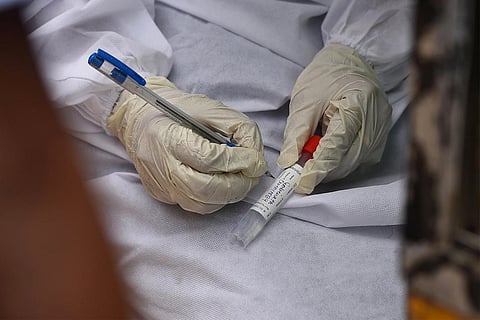

The parents of a two-year-old boy brought to our genetics clinic in Manipal were concerned that their only child was unable to walk. The boy, who was otherwise playful, interactive and could scribble with a pen, was, however, unable to sit unsupported. We evaluated him in detail and ran a few tests. We also did a blood test to check for a common genetic disease, which could cause weakness in muscles. The genetic test confirmed that the child had spinal muscular atrophy, a rare disease causing weakness in muscles.
A ‘rare disease’, for general understanding, is any disease, which affects a lesser number of individuals in a particular population. For example, sore throat due to bacteria is a common disorder in childhood. In contrast, a condition like spinal muscular atrophy is quite uncommon and affects only 1-2 among 100,000 individuals. Most of the rare diseases are ‘genetic’ in origin. A ‘genetic disease’ occurs because of a change or alteration in the DNA, which is the genetic code in human beings.
Spinal muscular atrophy is a progressive disease and is caused due to a variation in a gene named SMN1. Genes are found in pairs in human beings; one of the pairs is inherited from the mother and the other from the father. An individual who has a difference or a variation in one of the SMN1 gene pairs, is known as a carrier. A carrier does not develop any symptoms of the disease. In contrast, an individual who has a variation in both copies of SMN1 genes will develop symptoms of spinal muscular atrophy.
It is important to diagnose such a rare genetic disease because treatment has become available for spinal muscular atrophy. In India, some of the patients suffering from this condition have been fortunate to receive treatment from the drug manufacturing companies’ direct relief program. The child mentioned above was started on treatment. And after almost a year of starting therapy, his parents are optimistic and happy about the progress he has made. They are glad that their son is now able to grow well and sit unsupported.
Diseases like spinal muscular atrophy may sometimes recur in families. In such families, the chance of having an affected child with a similar disease is 1 in 4 in every pregnancy. Another advantage of doing a genetic test is to help such families for planning future pregnancies. If a genetic cause is identified, genetic testing can be done before a child is born and families can be provided genetic counseling.
It is essential that the public as well as doctors are aware of the genetic basis of rare diseases. In a country like India, with only a handful of trained professionals in clinical genetics, it is important for the doctors in other specialties to suspect and refer an individual to a trained genetic healthcare professional for work up and counseling. Many of the families visit multiple consultants in multiple specialties before a genetic diagnosis is made. The financial and the emotional burden that these diseases cause in a family can never be underestimated. The lives of caretakers, mostly that of women, become unbearable many times. Even though some of the rare diseases like thalassemia, spinal muscular atrophy, hemophilia, lysosomal storage disorders and duchenne muscular dystrophy have treatment options, availability and cost of drugs are still a barrier to most affected families in India.
Often public as well as specialist doctors consider genetic testing as extremely costly - ranging from Rs 1500 to Rs 20,000- and not directly beneficial in medical treatment of patients. This notion has to change. Over the last several years, there is a drastic reduction in the cost of genetic tests. Newer treatment options are available for some of the diseases. Moreover, a genetic diagnosis brings an end to multiple hospital visits and unending diagnostic tests, delivering a much required closure for many families.
Previously, genetic diseases were outside the purview of health insurance policies in India. Even though most genetic diseases manifest in early infancy or childhood, there are a few genetic diseases (Huntington disease) in which affected individuals start manifesting symptoms in adulthood. These individuals were excluded by insurance companies because they were considered as having ‘pre-existing’ illnesses present from birth. Recently the Insurance Regulatory and Development Authority of India (IRDAI) issued a guideline to ensure that genetic diseases were not excluded by any insurance provider from October 1, 2020. This is a relief to many families afflicted with rare genetic diseases.
Rare diseases pose a significant burden on the healthcare system in any country. To address issues related to rare diseases, the Union Health Ministry released the National Policy for Rare Diseases in January 2020. The document stressed the need for creating a rare disease registry in India and developing treatment guidelines for these diseases. There was also a provision to provide financial aid for families with rare diseases treatable by a one-time treatment.
To spread awareness about rare diseases, the last day in February every year is celebrated as the rare disease day. February is chosen as a special and rare month because unlike other months in a year February has a variable number of days. Though the day began as a European campaign in 2008, it is now being recognised and celebrated worldwide. The main objective is to increase awareness of rare diseases among public and policy makers. This year the day falls on Sunday, February 28.
“A nation's greatness is measured by how it treats its weakest members”, is a quote attributed to Mahatma Gandhi. As a nation, caring for persons with rare diseases is a responsibility that we cannot run away from.
Dhanya Lakshmi N is a clinical geneticist and Associate Professor in Department of Medical Genetics at Kasturba Medical College, Manipal. She is interested in caring for patients with genetic diseases, studying monogenic diseases including autoinflammatory diseases in India and popularizing science.